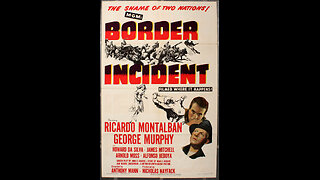Premium Only Content

The Strange Love of Martha Ivers (1946) | A classic film noir directed by Lewis Milestone
"The Strange Love of Martha Ivers" is a classic film noir directed by Lewis Milestone and released in 1946. The movie, set against a backdrop of post-World War II America, explores themes of power, deceit, and the consequences of a dark past. Starring Barbara Stanwyck, Van Heflin, Lizabeth Scott, and Kirk Douglas in his film debut, the film is widely regarded for its gripping narrative, complex characters, and atmospheric cinematography.
The story begins in a small industrial town where a fateful incident binds the lives of three characters: Martha Ivers (Barbara Stanwyck), Sam Masterson (Van Heflin), and Walter O'Neil (Kirk Douglas). As teenagers, they are involved in a traumatic event that sets the course for the rest of their lives. Martha, an ambitious and cunning woman, seizes an opportunity to shape her destiny, while Sam, a drifter with a mysterious past, becomes entangled in Martha's web.
Years later, Martha is a wealthy and influential figure in the town, married to the weak-willed district attorney, Walter. Their marriage is marked by secrets and mutual resentment. Sam returns to town, reigniting old tensions and unraveling the carefully constructed façade that Martha has built.
The film skillfully weaves a narrative of suspense, moral ambiguity, and psychological depth. The characters are morally complex, and their relationships are fraught with tension and manipulation. Barbara Stanwyck delivers a standout performance as Martha Ivers, portraying her as a formidable and enigmatic woman with a troubled conscience.
Van Heflin's portrayal of Sam Masterson adds depth to the film, as his character becomes a catalyst for the revelation of long-buried truths. Kirk Douglas makes a memorable debut as the ambitious and morally conflicted Walter O'Neil, showcasing the intensity that would become a hallmark of his career.
The film's cinematography, helmed by legendary cinematographer Victor Milner, contributes significantly to the film's noir atmosphere. The use of shadows, low-key lighting, and evocative camera angles enhances the sense of mystery and tension throughout the narrative.
Miklós Rózsa's haunting musical score further complements the film's dark and brooding atmosphere, underscoring key moments with emotional resonance.
"The Strange Love of Martha Ivers" stands as a quintessential example of film noir, with its morally ambiguous characters, intricate plot twists, and a visual style that captures the post-war disillusionment prevalent in many films of the era. The film's exploration of power dynamics and the long-lasting impact of past actions solidifies its place as a classic in the noir canon, and it remains a compelling and influential work in the history of American cinema.
-
 1:35:33
1:35:33
Classic Films & Movies Archive
6 days agoBorder Incident (1949) | Directed by Anthony Mann
250 -
 3:01:07
3:01:07
TimcastIRL
7 hours agoCharlie Kirk Assassinated, Suspect In Custody | Timcast IRL
595K847 -
 5:44:49
5:44:49
Redacted News
10 hours agoTurning the Tide: 9/11 Justice in 2025 — Day 1 with Sen. Ron Johnson, Richard Gage and More
165K74 -
 2:48:00
2:48:00
TheSaltyCracker
8 hours agoYou're Being Hunted ReeEEStream 9-10-25
271K561 -
 13:09:56
13:09:56
LFA TV
21 hours agoBREAKING: CHARLIE KIRK ASSASSINATED - WEDNESDAY 9/10/25
364K125 -
 1:31:08
1:31:08
I_Came_With_Fire_Podcast
7 hours agoCheck Fire: God Bless Charlie Kirk
78.6K22 -
 1:13:35
1:13:35
Glenn Greenwald
9 hours agoCharlie Kirk Assassinated; NATO Alleges Russian Drones Flew Over Poland, and More | SYSTEM UPDATE #512
276K288 -
 1:46:28
1:46:28
Badlands Media
23 hours agoAltered State S3 Ep. 45: The Assassination of Charlie Kirk
151K27 -
 8:56:53
8:56:53
Dr Disrespect
16 hours ago🔴LIVE - DR DISRESPECT - THE FINALS - NEW SEASON 8 LAUNCH EVENT W/ THE SHOTTY BOYS
275K10 -
 LIVE
LIVE
RealAmericasVoice
3 days agoHOME OF REAL NEWS
2,981 watching